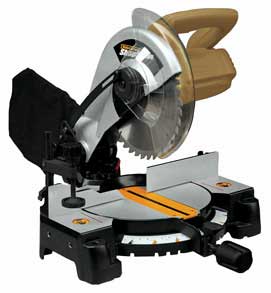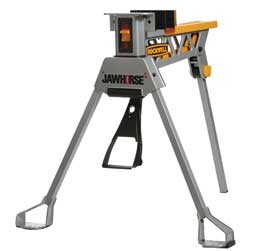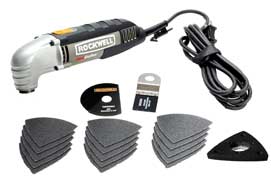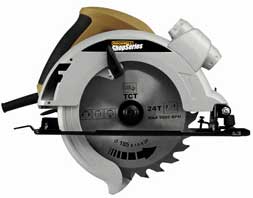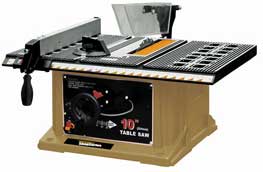
Five years ago, Rockwell Tools rolled out a brand-new line of handheld power tools at the National Hardware Show. It caught many of us media folks by surprise. I remember wondering to myself, Rockwell, as in Delta/Rockwell? Could this be a legendary tool phoenix rising out of the ashes? If you’ve run across what I’ll call the “new” Rockwell at your local hardware store or on-line retailer, you might have wondered the same thing. Is this the same Rockwell that was stamped on the machines in high school shop class or on that heavy, old circular saw in Dad’s tool cabinet?
Well, in a manner of speaking, the answer is both no and yes.
Craig Taylor, vice president of marketing for Rockwell Tools, recently provided me a more formal introduction to this growing line of DIY and woodworking power tools. If you’ve been curious about what’s up with Rockwell, hopefully this will clarify things.
Rockwell Tool’s parent company is Positec Tool Group, which was founded in 1994 as an OEM tool manufacturer for a number of different brands sold here the U.S. and abroad. After many successful years in the OEM business, the company decided to begin developing its own tool lines. Then, in 2005, Positec launched two new brands at that Hardware Show—WORX®, which is a full offering of electric yard and garden tools, and Rockwell Tools. Rockwell’s product line includes both professional-duty and more economically priced construction and woodworking tools.
So what about that familiar name? Craig explains it this way: “Rockwell has such a long heritage in building quality power tools. We at Positec thought it was a crying shame to see that brand out of the marketplace and a trusted name no longer used. Although there was no transfer of ownership, we acquired the brand name and are carrying forward its proud tradition for a new century.” According to Taylor, when you read the name Rockwell on one of these tools, it’s intended to deliver the same performance expectations as the tools you remember from years gone by. Rockwell is definitely back in the power tool business, albeit through a new and different company.
After just five years, Rockwell’s product line is quite impressive. In the company’s professional tool line, they offer circular saws, recips, jigsaws, corded and cordless drills, angle grinders, sanders, miter saws, bench grinders, a plunge router, power planer and a unique sawhorse with integral vise called the Jawhorse™ . The company also manufacturers the SoniCrafter™ multi-tool with a wide range of attachments for remodeling and DIY. A second line of tools—Rockwell’s ShopSeries™ —includes a variety of cordless, handheld power and benchtop tools aimed at more budget-minded DIYers and woodworkers.
Craig assured me that Rockwell is “dead serious” about backing up its shop-trusted name with the quality. The tools are manufactured in a 1-1/2-year-old state-of-the art Chinese facility. Its million square feet cover all phases of tool production, from castings to painting to final assembly and packaging. Rockwell is headquartered in Charlotte, North Carolina.
“We are one of only a few independent tool manufacturers out there. We’re not part of a great big conglomeration of power tool brands like some of our competition is. Rockwell is a stand-alone brand manufactured in one facility.”
An extension of Rockwell’s commitment to quality and customer satisfaction can be seen in the “Free Batteries for Life” program. As the name implies, the concept is pretty simple. If you purchase a cordless Rockwell or Rockwell ShopSeries tool and the battery dies, they’ll replace it for the life of the tool. The offer covers both NiCad and Li-Ion batteries. You need to register the tool initially and pay the shipping charges for replacement batteries, but otherwise the batteries are free to the original tool purchaser. And, there’s no need to send the old battery back to Rockwell; just recycle it responsibly.
“For six bucks and change, you’ve got a new battery,” Taylor says. “When we first launched this battery program, people wondered if we were serious. We definitely are. The program is designed to give our customers unlimited power…It goes against our grain to throw perfectly good tools away just because their batteries die.”
Taylor reports that over the past year or so, Rockwell has made significant strides in earning the trust of professional tool users. However, buyers are fairly evenly distributed between pros and DIYers or woodworkers. The SoniCrafter multi-tool and JawHorse tools have been the company’s most successful products so far, and overall distribution continues to grow.
And where are things headed? Taylor hopes that, as we move past the current recession, those who would have hired to have projects done several years ago will now consider doing that work themselves. “We want to help people re-learn and re-engage in the love of craftsmanship and in building something with their own hands. We’re people that love tools, and we’re building tools for people that love tools…at a price everybody can afford.”
